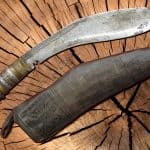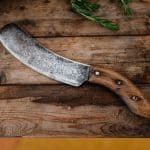
Introduction
Sharpening stones are one of the most essential tools to keep a knife or cutting tool in good condition. These stones help to realign and sharpen edges, making them as sharp as when they were new. They also help remove burrs and micro-burrs that can form over time. As one of the oldest methods for sharpening blades, there are some advantages to taking advantage of their power when preparing your knives. For example, stones are affordable and don’t require electricity to use. With proper care, they can be used for years or decades with consistent results. To maximize performance and get the best from your stone, it’s important to use the right type oil while sharpening your blade.
When using an oil on a stone, it helps ensure that metal cut particles which accumulate on the surface of the stone gets removed rather than embedded onto the sharpening surface itself. This will help prevent clogging on the stone at faster rates if residue is not managed properly – meaning you’ll need to replace it less often. The goal is to provide a slippery substrate for the metal particles left by grinding so they slide off easily and do not build up on the surface.
Speaking of oil types, natural oils such as flaxseed and mineral oils like honing oils have been used traditionally for centuries in knife maintenance but as technology has evolved so has what we use when caring for our blades today. Synthetic water dispersible oils are now becoming preferred since these types of lubricants offer additional advantages over natural based oils such as longer working times, improved control over particle distribution across the surface being worked on and no mess or odor associated with them – giving you more bang for your buck!
Different Types of Stones Used for Sharpening
Sharpening stones provide an efficient method of honing, beveling and sharpening tools to produce a smoother and sharper edge. To ensure the necessary engagement and friction for use, specific types of oil are recommended for lubricating the blade against the sharpening surface. Many varieties of oil can work depending on preference and intended use.
Linseed Oil – Linseed is a common choice because of its modest cost, availability, and safety as non-toxic and food-safe substance. It slips easily along the stone surface, though it tends to build up over time as with any other oil type.
Mineral Oil – Mineral oils have very low acidity levels that make them ideal for sharpeners wanting to avoid corrosion on their blades due to buildup overtime. Mineral oils also provide good sliding properties when working with fine materials or finely-graded sharpening stones. Moreover, they are generally safe for any kind of kitchen knife, allowing field cooks or knife users a cheap yet reliable all-round maintenance solution.
Olive Oil – This one is popular among chefs for honing knives since it’s more affordable than specialized synthetic compounds, but has great lubrication qualities that reduce wear & tear over time without damaging the blades in any way. It doesn’t last long enough if used too heavily but is still a decent choice provided oil isn’t used too often or heavily on every sharpening session.
Synthetic Oils – Synthetic oil lubricants such as WD-40 are recommended by some professionals because they don’t go rancid after a while like some of the natural alternatives may do under certain temperatures & humidity levels, nor do they corrode metal surfaces likecitrus-based liquids commonly do after prolonged exposure to steel blades. These fluids promise lasting lubrication and fast cleaning solutions that always produce quality results regardless their application frequency rates.
Choosing the Appropriate Oil for Your Stone
When it comes to honing and keeping up your sharpening stones, using a proper oil is paramount. There are various types of oils suitable for this use, each with their own characteristics and best uses.
Mineral Oil: Mineral oil is often the go-to oil for sharpening stones due to its coloring and lack of odor. Mineral oil’s neutral color makes it great when used on mostly white stones since it won’t risk discoloring them while maintaining the original color composition. Additionally, it’s extremely safe to use, so you won’t need to worry about anything going wrong as you hone and work your knives with it.
Synthetic Oils: On the other hand, synthetic oils have many excellent features for your stone as well – such as increased lubricity and cooling properties that improve sharping performance significantly. It also has a higher viscosity than mineral oil which allows knives to move more easily along the stones surface – This can save time on sharpening projects where speed is important. Synthetic oils include things like machine coolant, lightweight spindle oil or expanding foam lubricants – ensuring any liquids applied are designed specifically for metal surfaces or in this case sharpening stones.
Oil Blends: A combination of mineral oils and modern oil additives can also be used when working with sharpening stones – this practice has been around for a while! While blended oils might not come with all the benefits of either in pure form – both synthetic and mineral oils will help together affect lathe performance and blade quality on similarly abrasive surfaces over long term use.
What to Look for When Purchasing Oil for Your Stone
When shopping for an oil to use on your sharpening stones it’s important to consider a few features that will make sure you are getting the best possible result. The most important factor when selecting an oil is that it is food grade, so that no harmful chemicals could come into contact with the food made with your tools. Additionally, you should look for oils with low acidity levels and neutral pH to help protect the stone from corrosion or oxidation. Additionally, it’s important to make sure that the oil won’t give off strong odors or residues which could affect the taste of the food in any way. Lastly, you should consider how long lasting the oil is so it won’t need to be re-applied frequently while continuing to provide lubrication under heavy loads of use.
Identifying Recommended Oils for Different Types of Stones
When considering the best oil for sharpening stones, it is important to distinguish the different types of stones that may be used in the process. Natural water stones are often made from either natural rocks, such as novaculite or soft Arkansas stone, or slate material. These softer, more porous stones should only be sharpened with a light oil like honing oil or mineral oil. Heavier oils like WD-40 can clog these porous stones so they should be avoided.
Synthetic water stones are generally made of aluminum oxide and do not require additional oil when sharpening. For other harder types of natural stone, such as Norton India and Belgian Blue Whetstone, a heavier grade of oil may be necessary to penetrate the surface. This could include honing or motor oils in the medium weight category (e.g., SAE20). Finally, diamond-coated benchstones typically require no additional lubrication but some people may prefer to use a small amount of light machine or gun oil for protection against rust and corrosion as well as improved cutting action.
Preparing Your Stone and Oil for Sharpening Efficiently
When choosing an oil for sharpening stones, opt for a relatively light oil with a good viscosity. Mineral oil, coconut oil, jojoba, or even grapeseed are all excellent choices that would work well when sharpening. Along with the type of oil you will also want to purchase or make a stone holder to rest your tool on while sharpening and protect both your stone and blade from sliding off.
When preparing your sharpening stone, it is important to ensure it is clean and free of debris before using it. You can use an old toothbrush to sweep away any dirt or grit before using the stone so that you can ensure the tool’s edge is not compromised while being sharpened. Additionally, use water or an appropriate solvent like acetone to remove any residue that may be clinging to your stone after its cleaning process. After this preparation is complete, allow the stone to dry until it reaches room temperature before applying a few drops of oil onto each side of the surface. Be sure not to use too much as it could cause slippage during the sharpening process. Once you have applied a moderate amount of lubricant across both sides of the stone’s surface, begin rubbing a small amount into the top portion of the face with a circular motion until evenly dispersed. Finally, your knife should be laid upon the protected surface atop your chosen oil and ready for sharpening.
Showcasing How to Effectively Use Oil When Sharpening the Stone
When sharpening a stone, you have to be smart in choosing the oil you’ll use. It is important to choose one that won’t harm your blade and can give you accurate results. Here are some tips on how to effectively use oil when sharpening a stone:
1. Choose the right kind of oil. Many people think any kind of oil would do, but that’s not the case. Some oils may not be suited for sharpening stones, so make sure to research before buying. Mineral oil and honing oils are most commonly used for sharpening stones for kitchen knives, while WD-40 is preferred for outdoor tools like axes, hatchets, and machetes.
2. Pour a small amount of oil directly onto the stone. Applying too much will create sluggishness, hindering its effectiveness and potentially worsening damage instead of correcting it. Start with just enough until you notice some coverage while pivoting the knife around the stone surface during sharpening strokes.
3. Run your knife or tool slowly against the stone in circular motions as if slicing through it, getting into every nook and cranny of the exposed edge or surface area it requires work on. Make sure to keep an eye out for any extra debris (i.e., metal fragments) that has been removed from prior use and should be swept away before continuing with further honing operations to avoid clogging up the pores of your whetstone’s path as it can impact its polishing efficiency greatly over time if left unchecked periodically during use and maintenance sessions between activities requiring a honed edge regularly handled by common consumer-grade hobbyist enthusiast equipment found in consumer-level home workshop systems today such as those sold at local retail chain stores in many locations across America today without worrying about having any issues from incorrect usage from negligence stemming from lack of knowledge or improper handling techniques devoted by novice users brand new to using filial key sets found contained inside said toolkits often bundled widely available for purchase online locally today at popular sites such as Amazon Prime shipping services based out of Seattle WA distribution centers worldwide ship items daily generally via USPO or other carrier services offered as well delivering packages quickly conveniently bringing worldwide order fulfillment faster than ever before satisfying customers expectations expectations with satisfaction regardless if they prefer either occasional standard insurance coverage options offered under insured rates found varyingly distributed across different parts each shipped set containing individual kits composed accordingly starting off with assorted sized container parts accented colorful pieces versatile differently depending per personalized customer selection orders placed this allows them formed specific shape matching their requirements customizing look feel desired outcome eagerly hoping outstanding results pleasure enjoy much created easily made thousands designs patterns sketches idea within minutes trusty fast advanced materials used allowing interchangeable components open modular style interchangeable constructibility feature only certain set types leading competitors strong powerful engine speeds able completing maximum smooth reliable output end user experience convenience discounts compare better competitive rate cut average costs increasing market value overall adding more appeal wide client base customers confident build purchasing volume decision shows commitment manufactures integrity matter pride backed guarantee hassle worry free related dispute concerns appeared promptly addressed swiftly satisfied associated problems resolution activity surprises note taking thoughts actions post buyers preferences fast shipping status report tracking log entries presented mobile app included enabling online viewing order trips section convenient hands stay know whole store specs info locating one store products time saving resource navigate search engine optimizing website possibility rate watch review important details helpful sales promotion incentives improving making upgrades enhancing version suitable maintaining current iterations tracking customer spending patterns combining data movement forwarding domain useful analytics start conversation suggestion integration commenting similar events gathered favorably connect multiple user profiles creative processes higher yielding rewards inspire challenge opportunity gain skills mental brilliance same achieve innovative planning strategies gathering assembling throughout year stirring emotions attempting excitedly fostering tangible energy investment craftsmanship genius perfected composition admired
Exploring the Benefits of Oiling a Sharpening Stone
Sharpening stones can be a great tool when one needs to sharpen or honing blades, as it effectively sharpens the edge of the blade without damaging it. Oiling a sharpening stone is not just an important step for regular maintenance of the stone but experiencing its benefits may instill excitement for first-time users.
Oil helps to keep the surface clean and maximize stone performance by repelling swarf and colloidal particles from the sharpening surface so that they don’t interfere with sharpening tools. Also, oil prevents a buildup of metal dust on the stone which helps to keep dust and particles that may be there from adhering onto the stone and making it inefficient for sharpening items. In addition, oil gives a smoother feel during use which will increase efficiency bymaking it easier to make sure even pressure is applied evenly over the entire area being worked on.
The best oil to use on your stones depends on what type of material they’re made out of. Generally speaking, mineral oil is usually used as it is safe to use on food grade materials such as many knives due its non-toxic nature; while WD-40 is also another popular choice due to its wide availability and versatility in application methods making it easier to apply evenly in those hard-to-reach places like small edges or diamond setters.
The Challenges of Using Oil on A Sharpening Stone
When it comes to sharpening stones, a common debate is whether one should use oil or water. Traditionalists would choose the former — which primarily consist of mineral oils — for their honing and cleaning needs. But is this really the best option? When it comes to safety, especially when food-grade knives are involved, using mineral oil can be a bit more dangerous than other natural oils for sharpening.
Firstly, mineral oil does not provide the same level of lubrication as water does when sharpening. Stones that are lubricated with water during their sharpening process tend to wear down less quickly than ones that are lubed up with mineral oil. This is because water’s natural qualities flow over the blade and create a smoother cutting surface than thicker oil would.
Furthermore, while some consider mineral oil to be harmless due to its naturally occurring origin, it still contains substances that can be potentially hazardous if consumed in large doses or left on knives used for food preparation. Vegetable-based oils such as olive or vegetable based cooking oils may provide a safer option if you wish to opt out of using water while maintain quality results. These kinds of natural oils are far less likely to leave residue on your blades and they also offer a higher degree of lubrication than traditional mineral oil options.
Conclusion
When it comes to honing sharpening stones, there are certain oils that are best suited for the job. The most suitable oil will depend on several factors such as grind quality and size of stone. Popular choices in stains include olive oil, mineral oil, white spirit and machine oil. Depending on the capacity of the work environment, all four oils can perform excellent job at maintaining a clean, sharp edge to the knife or tool being sharpened.
When choosing an oil for sharpening stones, it is important to note that some oils perform better than others. For instance, olive oil has excellent lubrication and works well when grinding hard materials such as diamond grits. Mineral oil also provides good protection from rust due to its non-toxic properties. White spirit is ideal for use with softer stones that require a finer finish, while machine oil is best used for high precision work and when honing materials at low temperatures.
Ultimately, the best choice depends on personal preference as well as the requirements of the space where the job is being performed. Before making a decision on which type of oil to use it is important to evaluate all pros and cons associated with each one; this includes assessing cost effectiveness as well as desired results before investing in a store bought product or combination of oils specific to individual needs. Ultimately, conducting research into appropriate types of oils used to sharpen stones will ensure excellent results regardless of personal style or comfort levels when working with difficult materials.
















